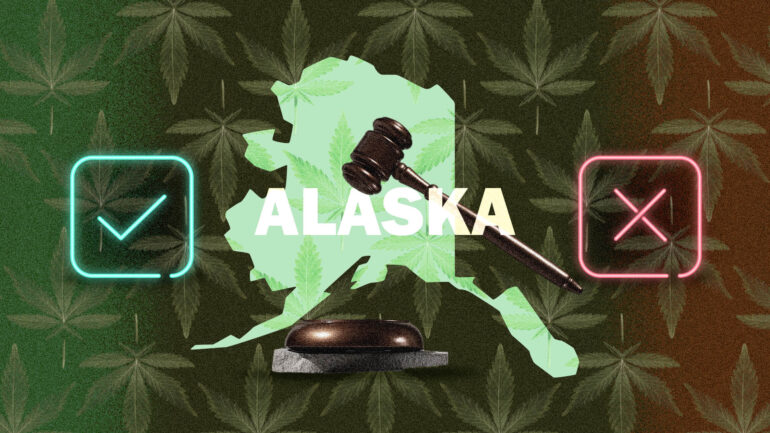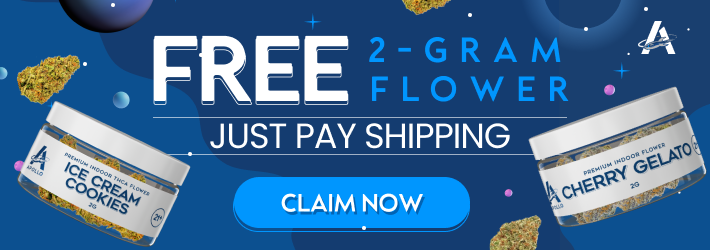Key Takeaways
- Alaska has a recreational weed law that allows adults aged 21 or over to buy, possess, and transfer up to 1 oz of marijuana.
- There is also no penalty for possessing up to 4 oz in your home. Having between 1 and 4 oz outside your home is punishable by up to a year in jail and a maximum fine of $10,000.
- Alaska’s medical marijuana program permits patients with qualifying conditions to have up to 1 oz of cannabis.
Weed is legal for both medical and recreational use in Alaska.
Adults aged 21 and over can legally possess up to one ounce (1 oz / 28.35 grams) on their person or 4 oz in their residence.
You can also get medical marijuana in Alaska, although in both cases you’ll buy from one of the recreational cannabis retailers in the state.
Despite this liberal attitude to weed in Alaska, there are still rules and regulations you should know before you light up in the state.
Is Marijuana Legal in Alaska?
Yes, weed is completely legal in Alaska, both recreationally and medically.
Adults aged 21 and over in the state can buy and possess up to one ounce of marijuana.
Is Recreational Marijuana Legal in Alaska?
Recreational weed is legal in Alaska following the passage of Measure 2 (a.k.a. the Alaska Marijuana Legalization Initiative) in 2014, by a 53-to-47 margin.
The law makes it legal for adults aged 21 or over to buy, possess, and transfer (without payment) up to 1 oz of marijuana (28.35 g).
It also says that you can possess 7 grams of cannabis concentrate, or just so much in combination that the total amount of THC you possess is less than 5.6 grams.
There is also no defined penalty for possessing up to 4 ounces (113.4 g) in your home, which basically means that this is also legal. This is because Alaska has a long history with relaxing (and then re-tightening) its weed laws.
In 1975, the state not only decriminalized possession (just four years after the official “start” of the war on drugs, no less), but the Supreme Court also ruled (Ravin vs. State) that adults in the state had the right to possess a small amount of cannabis for personal use, based on personal privacy rights.
While the fine was removed, in 1986, the state decriminalized 4 ounces in the home and 1 ounce outside it. This was removed in the late 80s, but its legacy is clearly present in Measure 2.
You can buy cannabis at state-licensed dispensaries across the state. Changes to the law in 2019 allowed on-site consumption at approved locations and became the first state to license such a facility in 2020.
Cultivation is also permitted, up to 3 immature and 3 mature plants per person (more on this later).
Penalties for Excess Possession
Although you’re legally allowed to possess up to an ounce of marijuana on your person and four in your home, if you have more than this, you will face penalties.
- If you have between 1 and 4 oz outside your home, it’s considered a misdemeanor, and carries a penalty of up to a year in jail and a fine of up to $10,000.
- If you have more than 4 ounces, it’s considered a felony. This carries a penalty of up to 5 years in jail and a maximum fine of $50,000.
- Additionally, if you have any amount of marijuana (unless entirely within your private residence) within 500 feet of school grounds or a recreation center, it’s also a felony with a punishment of up to 5 years and a fine of up to $50,000.
Is Medical Marijuana Legal in Alaska?
Medical marijuana is legal in Alaska following the passage of Measure 8 in 1998, which allows patients to use marijuana for certain medical purposes.
As in most states, this law is only applicable to certain qualifying medical conditions, and you have to obtain a recommendation from a doctor.
Once you have this and have applied for (and been approved for) your medical marijuana card, then you can buy weed as a medical patient in the state.
However, with the change in Alaska weed laws following Measure 2, this isn’t really necessary, since you can buy it while waiting for the card anyway and the dispensaries are the same.
Medical Marijuana Patient Possession Limits
Patients are allowed to possess up to 1 ounce of marijuana in useable form.
However, as with the Alaska adult use law, there is no punishment for possession of up to 4 ounces provided it’s in your home.
How to Get a Medical Marijuana Card in Alaska?
The process for getting a medical marijuana card in Alaska is very similar to the process in most states.
First, you need to have a signed physician’s statement, attesting that you have one of the qualifying conditions and that you might benefit from medical marijuana.
The qualifying conditions are:
- Cachexia
- Cancer
- Chronic Pain
- Glaucoma
- HIV or AIDS
- Multiple Sclerosis
- Nausea
- Seizures
Once you have the physician’s statement, you can fill in the application form, enclose a photocopy of your ID, and pay a $25 application fee ($20 for renewal) to get your card.
Can You Consume in Public in Alaska?
Despite Alaska weed legalization having been a reality for 8 years now, you cannot consume in public outside of a licensed consumption location.
In fact, it has a specific law and carries a fine of up to $100.
Note that this law doesn’t specify smoking, so technically you can get in trouble for even taking an edible in public.
Can You Drive Under the Influence of Weed in Alaska?
As in every state, it’s illegal to drive under the influence of marijuana in Alaska.
Legalization doesn’t matter here: alcohol is legal but you still can’t drive drunk.
Although Alaska has an implied consent law, the text specifies that anybody driving in the state has consented to a test for the alcohol content of their breath, blood, or urine. So unless you’re in an accident that causes serious physical injury, you should only submit to chemical testing for marijuana on a voluntary basis – at least theoretically, you can’t be punished for saying no!
However, if through other sobriety assessments or testing, you are found to have driven with marijuana in your system, the punishments are:
- For a first offense, you’ll receive a minimum fine of $250 and up to $1,500, 72 hours or more consecutive jail time, your license will be suspended for 90 days, and you’ll have an ignition interlock device fitted.
- For a second offense, you’ll receive a fine between $500 and $3,000, 20 days or more of jail time, one-year license suspension and you’ll have an ignition interlock device fitted.
- For a third offense (at any time), you’ll receive a fine of between $1,000 and $4,000, a minimum of 60 days in jail, license revocation for three years and a mandatory ignition interlock device.
- For a third offense within 10 years, the minimum fine is $5,000 (up to $10,000 maximum), a minimum of 120 days in jail and your license is revoked for life.
- For a fourth offense (at any time), you’ll receive a find of between $2,000 and $10,000, a minimum of 120 days in jail, your license will be revoked for five years and you’ll have an ignition interlock fitted afterward.
- For a fourth offense within 10 years, the minimum fine is $10,000, a minimum jail term of 240 days and your license will be revoked for life.
- For a fifth offense (at any time), you’ll be put in jail for at least 360 days, and your fine will be a minimum of $7,000.
- For a fifth offense within 10 years, you’ll get a minimum of $10,000 in fines, be put in jail for at least a year and your license will be revoked for life.
Is Delta-8 THC Legal in Alaska?
Despite having passed a hemp bill in line with the Farm Bill in 2021 (updating a 2018 law), delta-8 THC is not legal in Alaska.
This is because the state’s controlled substances bill includes tetrahydrocannabinols (in general) and all forms of isomers (optical, position, or geometric), which is broad enough a definition to cover delta-8, delta-10 and other alternative cannabinoids like HHC and THC-O.
In turn, the THCs in hemp are not exempted from the controlled substances bill.
This might seem strange given the legalization of weed in the state, but it’s often states with legal markets that are the quickest to crack down on these alternative cannabinoids.
RELATED: Where Is Delta-8 THC Legal? A State-by-State Map
Is Weed Decriminalized in Alaska?
Weed is legal in Alaska now, so decriminalization is essentially a non-issue.
However, in the past, weed was decriminalized in Alaska. It was the second state to decriminalize cannabis after Richard Nixon effectively started the war on drugs in 1971, making possession of cannabis punishable by a $100 fine from 1975 onwards.
As discussed above, the law was reverted in 1982, but then weed was decriminalized again in 1986, up to one ounce outside of the home and 4 ounces in the home.
Things shifted back and forth with medical rules, re-criminalization, and so on until Measure 2 was approved in 2014. So Alaska has decriminalized weed multiple times but eventually went all the way.
Is Growing Weed Legal in Alaska?
Growing weed is legal in Alaska under both the medical and recreational cannabis programs.
The rules in both cases are the same: you can have up to 6 plants per adult (21 and over), with only 3 of them being flowering.
You can also possess the cannabis produced by the plants, provided you keep any amounts beyond one ounce in your home. If there are multiple adults in the same household, there is a hard limit of 12 plants, with 6 of those being flowering.
As in most states, the plants can’t be visible to the public unless they have optical aids such as binoculars or drones.
Conclusion
Alaska is one of the best states in the country for stoners, with a long-standing legalization law and medical cannabis, as well as plenty of dispensaries.
You can’t use cannabis in public, and delta-8 and other alternative cannabinoids are restricted, but overall the laws are very liberal. There are even dispensaries that also have cafes for you to consume in.
However, you should be careful out on the street, and make sure that you’re allowed to use weed if you’re in a hotel or rented property. As long as you do that, you’ll have a great time in the state.

